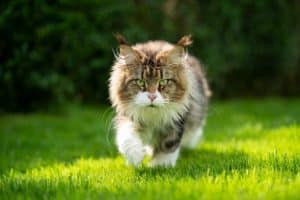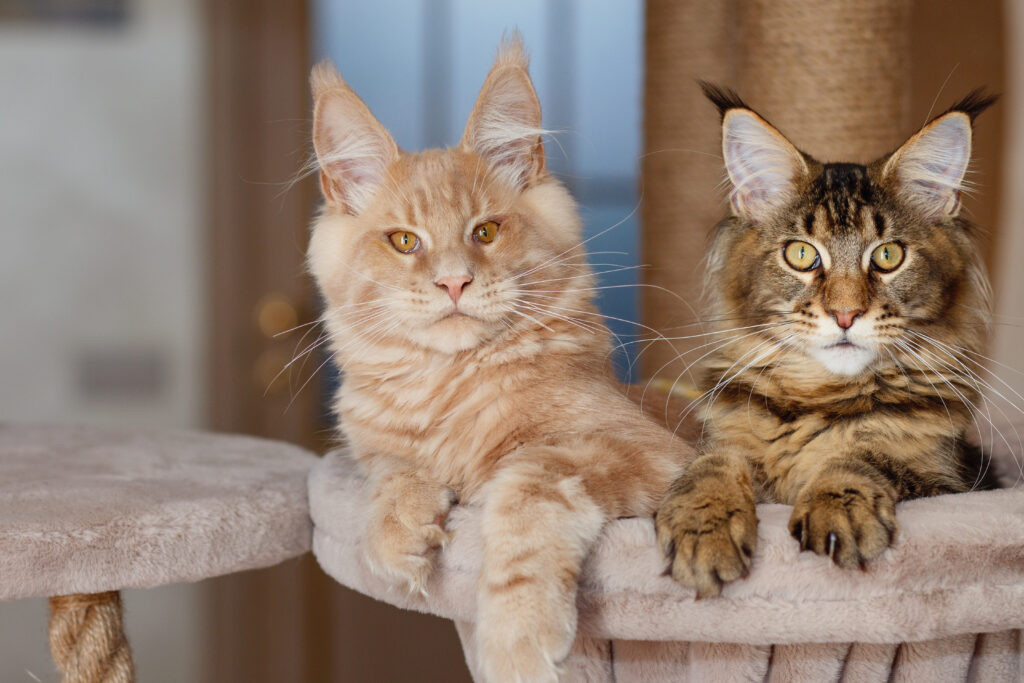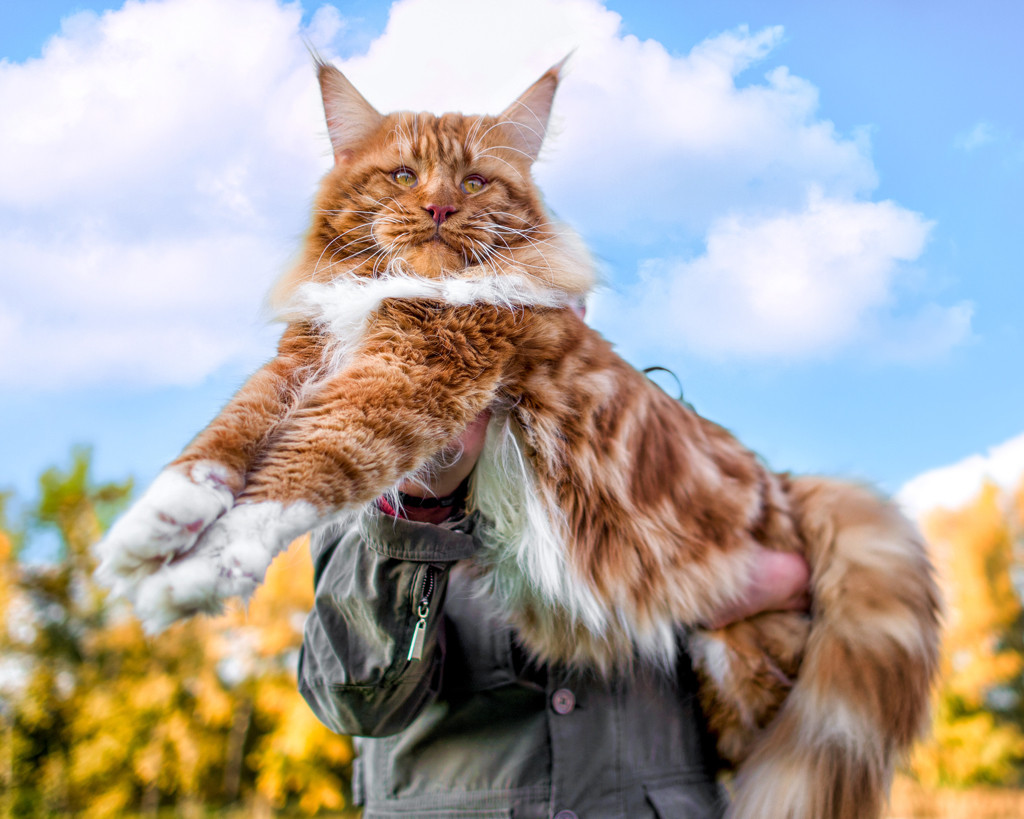The Maine Coon cat, often described as a gentle giant, is a captivating breed renowned for its impressive size, friendly demeanor, and distinctive appearance. If you’re curious about these magnificent felines and wondering, “What Is A Maine Coon Cat?”, you’ve come to the right place. This breed, with its dog-like personality and striking looks, has captured the hearts of cat lovers worldwide. Let’s delve into everything you need to know about Maine Coon cats, from their fascinating history to their care requirements.
Maine Coon Size: The Gentle Giant Unveiled
 A beautiful Maine Coon cat
A beautiful Maine Coon cat
The Maine Coon cat’s size is undeniably one of its most defining characteristics. Often cited as the largest domestic cat breed, they are truly impressive in stature. Males typically weigh between 18 to 22 pounds or even more, with some reaching a whopping 25 pounds. Females are slightly smaller, generally weighing between 12 to 15 pounds. Beyond weight, their length is equally remarkable, often stretching over 40 inches long.
The Guinness Book of World Records even recognized a Maine Coon named Stewie as the longest domestic cat ever recorded, measuring an astounding 48.5 inches. While Stewie’s record is exceptional, many Maine Coons capture attention for their size. Zeus, another enormous Maine Coon, gained viral fame on TikTok, showcasing his gigantic size as he playfully reached the kitchen counter on his hind legs.
@zeus.mainecoon.official Morning vibes 😜 #mainecoon #blackmainecoon #mainecooncat #giantcat #giantmainecoon ♬ Hip Hop Background(814204) – Pavel
Despite their imposing size, Maine Coons are known for their gentle and good-natured temperament, earning them the title of “gentle giants” of the cat world.
Personality and Temperament: The Dog-Like Cat
 Maine Coon kittens playing on a cat tree.
Maine Coon kittens playing on a cat tree.
Beyond their size, Maine Coons are celebrated for their exceptional personality. Often described as “dog-like,” they exhibit traits not commonly associated with cats, such as loyalty and sociability. Their friendly and outgoing nature made them popular pets in their native American Northeast, and these traits continue to endear them to families today.
Maine Coons are known for being incredibly sociable and enjoy being around their human families. They are not aloof or independent like some breeds; instead, they actively seek companionship and interaction. This makes them excellent companions for households with children and other pets, including dogs. Their gentle and patient nature allows them to integrate well into diverse family dynamics.
These cats are also known for being playful and curious, enjoying interactive play sessions and exploring their surroundings. They often follow their owners from room to room, eager to participate in household activities. While they are active and playful, they are not overly demanding or hyperactive, striking a perfect balance for many owners.
The Mysterious Origin of the Maine Coon
 Maine Coon cat
Maine Coon cat
The exact origins of the Maine Coon cat are shrouded in some mystery, with several captivating myths attempting to explain their emergence. One popular, albeit genetically impossible, theory suggests they are the result of matings between domestic cats and raccoons. This myth likely arose due to their bushy, raccoon-like tail and substantial size. Another romantic theory links them to Marie Antoinette, suggesting she sent her longhaired cats to America while attempting to flee France during the French Revolution.
However, the most plausible explanation points to a more natural and evolutionary origin. As cats were valued for pest control on ships and farms, various breeds intermingled, particularly in the harsh climate of New England. It is believed that longhaired cats brought by European settlers, possibly including breeds from Scandinavia and Northern Europe, bred with local shorthaired cats. Through natural selection, the Maine Coon evolved, developing a dense coat, large size, and hardy constitution to withstand the region’s cold winters.
Regardless of their precise origins, Maine Coons rose to prominence in the late 1800s, gaining popularity at cat shows and becoming a favored breed in North America. Although their popularity briefly waned in the early 20th century with the introduction of Persian and Himalayan breeds, dedicated breeders revived the Maine Coon, restoring it to its current status as one of the most beloved cat breeds.
Maine Coons in Popular Culture
Maine Coon cats have firmly established themselves in popular culture, celebrated for their majestic appearance and endearing personalities. Their distinctive looks, often featuring tufted ears, bushy tails, and large size, make them easily recognizable and captivating figures in media.
The breed’s recent surge in popularity on platforms like TikTok highlights their modern appeal. Even celebrities like rapper Megan Thee Stallion have embraced the breed, further cementing their status as desirable and fashionable pets.
Maine Coons frequently appear in movies, TV shows, and internet memes, often embodying elegance, mystery, or gentle strength. In the animated film The Secret Life of Pets, a Maine Coon character named “Reginald” humorously portrays the breed’s regal yet laid-back nature. Their striking looks and gentle demeanor also make them popular subjects for social media influencers and online pet communities. Their “dog-like” intelligence and affectionate nature further contribute to their online popularity, showcasing their playful antics and stunning beauty to a wide audience.
Their majestic appearance and loving nature have also led to their inclusion in literature and fantasy works, where they are often depicted as mystical companions or wise creatures, solidifying their place in contemporary pop culture as more than just pets, but as iconic figures.
Unique Physical Traits of a Maine Coon Cat
 maine coon cat
maine coon cat
Maine Coon cats possess a striking combination of physical characteristics that set them apart. Their most notable feature is their size, being the largest domestic cat breed. They typically weigh between 12 to 25 pounds or more, with males often reaching the higher end of this range.
Their coat is another defining trait. Maine Coons have a long, thick, and water-resistant coat, essential for surviving harsh winters. This coat is often described as shaggy and uneven in length, with a noticeable ruff around their neck. They come in a variety of colors and patterns, with brown tabby being one of the most common and recognizable. Tufted ears and paws are also characteristic, adding to their wild and rugged appearance. Their bushy tail, often as long as their body, serves both for balance and as insulation against the cold.
Beyond their coat and size, Maine Coons have a sturdy and muscular build. They have large paws and substantial bone structure, contributing to their overall impressive presence. Their facial features are also distinctive, with high cheekbones, a strong muzzle, and expressive eyes that range in color from green to gold to copper.
Adopting and Caring for a Maine Coon
Adopting a Maine Coon cat can bring immense joy, but it’s essential to understand their specific needs. Their sociable and affectionate nature means they thrive on interaction and companionship. They are not cats that do well being left alone for extended periods. They require regular attention, playtime, and interaction with their families.
Their long, dense coat requires regular grooming to prevent matting and tangles. Brushing at least two to three times a week is necessary to keep their coat healthy and to manage shedding, which can be significant, especially during seasonal changes.
Due to their larger size, Maine Coons may require more food than average-sized cats. Providing a high-quality diet appropriate for their age and activity level is crucial for maintaining their health and weight. They also need ample space to move around and play. While not necessarily more active than other breeds, their size means they need room to stretch and exercise comfortably. Providing scratching posts and interactive toys will help keep them physically and mentally stimulated.
Maine Coons are generally good with children and other pets, but gradual introductions are always recommended to ensure a smooth transition into a new household. With proper care, attention, and understanding of their unique needs, a Maine Coon can be a loving and rewarding companion for many years.
Training and Grooming Your Maine Coon
Training a Maine Coon is generally a positive experience due to their intelligence and eagerness to please. They are known to be one of the more trainable cat breeds, often likened to dogs in their ability to learn commands and tricks. Positive reinforcement techniques, using treats, praise, and affection, work exceptionally well with Maine Coons. Starting training early in kittenhood is beneficial, but adult Maine Coons can also learn effectively.
Litter box training is typically straightforward, but providing a large litter box suitable for their size is important. Many Maine Coons can even be leash-trained, enjoying walks outdoors with a harness. Interactive play, puzzle toys, and games like fetch are excellent for keeping their minds engaged.
Grooming is a crucial aspect of Maine Coon care. Regular brushing two to three times a week is essential to prevent mats and reduce shedding. Using a wide-toothed comb and a slicker brush can effectively manage their dense fur. During shedding seasons, more frequent brushing may be necessary. While bathing is not routinely required, occasional baths with cat-safe shampoo can help maintain coat cleanliness. Regular nail trimming, ear cleaning, and dental care are also vital components of their grooming routine.
Maine Coon Nutrition and Health
Proper nutrition is paramount for the health and well-being of a Maine Coon. Their large size and active nature necessitate a balanced, high-quality diet rich in animal protein. Look for cat food that lists meat sources like chicken, turkey, or fish as primary ingredients. Protein is crucial for muscle development and maintaining their luxurious coat. Omega-3 and omega-6 fatty acids, often found in fish oils, are also beneficial for coat and skin health.
Portion control is important to prevent obesity, as Maine Coons can be prone to weight gain if overfed. Feeding them two to three measured meals a day is recommended, adjusting portion sizes based on their age, activity level, and weight. Providing both wet and dry food can be beneficial, with wet food contributing to hydration and dry food supporting dental health. Fresh water should always be readily available.
While generally healthy, Maine Coons are predisposed to certain health conditions. Hypertrophic cardiomyopathy (HCM), a heart condition, and hip dysplasia are among the more common concerns. Spinal muscular atrophy (SMA) is another genetic condition to be aware of. Regular veterinary checkups are crucial for early detection and management of any potential health issues. Maintaining a healthy weight through proper diet and exercise is also important for preventing obesity-related health problems.
Fun Facts About Maine Coon Cats
- The Maine Coon is the official state cat of Maine, designated in 1985, highlighting their strong connection to the region.
- A Maine Coon cat won “Best in Show” at the first major cat show in North America held at Madison Square Garden in 1895, marking an early recognition of the breed’s excellence.
- Despite the myth, Maine Coons are not a hybrid of cats and raccoons. Their bushy, raccoon-like tail likely contributed to this misconception and their name.
The Endearing Charm of the Maine Coon
In conclusion, understanding “what is a Maine Coon cat” reveals a breed of remarkable charm and distinction. From their impressive size and striking appearance to their friendly and “dog-like” personalities, Maine Coons are truly captivating companions. Their gentle nature, combined with their playful spirit and intelligence, makes them wonderful additions to many households. Whether you’re a seasoned cat enthusiast or new to the world of felines, the Maine Coon offers a unique and rewarding experience, embodying the best qualities of a feline companion.
Interested in learning about other cat breeds? Explore more cat breed profiles.

